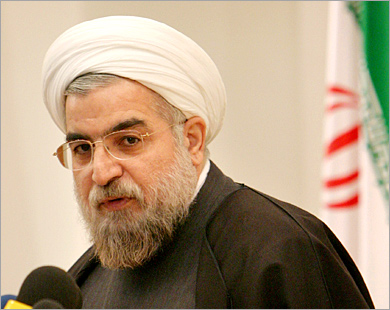Iranian President Hassan Rouhani stipulated that all parties adhere to their commitments in the nuclear deal and lift the sanctions on his country before they back down from reducing their commitments. He also informed his French counterpart, Emmanuel Macron, that the agreement is not negotiable, warning of any new action against Iran.
On Wednesday, Rouhani said, "If there is a serious will to lift the sanctions, Iran will backtrack on steps to reduce its nuclear commitments ... and if all parties abide by their commitments in the nuclear deal, we will do so."
The Iranian president added that his country witnessed a slight change in the statements of the US administration, but did not witness a practical change in its policy.
For its part, the Iranian presidency said that Rouhani told Macron that the nuclear deal was not negotiable and that the only way to preserve it was to lift US sanctions.
Rouhani also stressed during the call that any non-constructive measure or position at the meeting of the Board of Governors of the International Atomic Energy Agency would complicate the situation.
The Elysee Palace announced that Macron stressed in the call the importance of Tehran taking clear initiatives and without delay in order to allow the opportunity to resume dialogue with all the signatories to the nuclear agreement.
The French president also expressed to his Iranian counterpart his deep concern about Iranian decisions, which he said violated the terms of the agreement, referring to Tehran's recent decisions to reduce its obligations stipulated in the nuclear agreement in response to Washington's withdrawal from the agreement and its tightening of sanctions on Iran.
In turn, French Foreign Minister Jean-Yves Le Drian said that Germany, France, Britain and the United States will work to pass a resolution during the meeting of the Board of Elders of the International Atomic Energy Agency on Friday condemning Tehran and calling on it to back down from reducing its obligations to the agency.
Le Drian had said that European countries would protest within the framework of the IAEA board of governors to Iran's suspension of some inspections of its nuclear program.
Iranian refusal
On Sunday, Iran ruled out an informal meeting with the United States and European powers to discuss ways to revive the nuclear deal, and insisted that Washington lift all its unilateral sanctions, while the White House said it was "disappointed" with the Iranian position.
The Director-General of the International Atomic Energy Agency, Rafael Grossi, said yesterday that the activities of the IAEA inspectors in Iran's nuclear facilities should not be a bargaining chip in the negotiations, and Grossi made clear that abandoning the additional protocol is a great loss because it limits the freedom of the agency's inspectors.
In a related context, Israeli Foreign Minister Gabi Ashkenazi said that Israel has reached understandings with the United States from behind the scenes to ensure that neither of the two countries will be surprised by everything related to the negotiations to return to the nuclear agreement with Iran.
Ashkenazi described relations with the administration of US President Joe Biden as good, adding that a mini-Israeli body headed by Benjamin Netanyahu decided to conduct a quiet and non-confrontational dialogue with it regarding reaching an agreement that protects Israeli and regional interests and prevents Iran from becoming a nuclear state.

